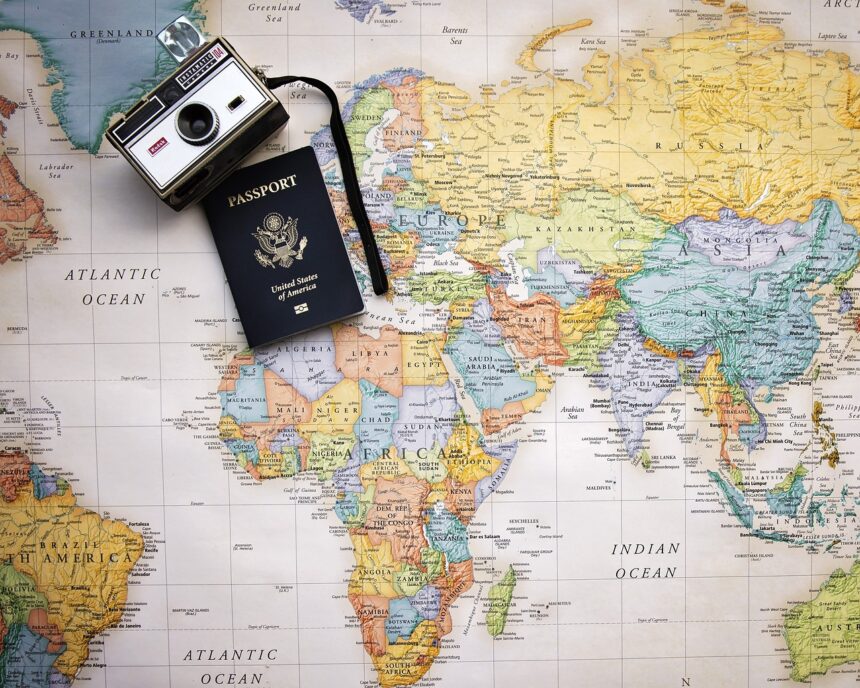Traveling the world is a transformative experience that can broaden your horizons, challenge your perspectives, and enrich your life in countless ways. Whether you’re seeking adventure, personal growth, cultural immersion, or simply a change of scenery, the act of exploring new destinations can be profoundly rewarding.
Travel not only exposes you to diverse customs, cuisines, and ways of life, but it also encourages you to step outside your comfort zone, adapt to unfamiliar environments, and develop a greater appreciation for the interconnectedness of our global community. By embracing the unknown and embracing the unfamiliar, you can gain a deeper understanding of yourself and the world around you.
Moreover, travel can have a positive impact on your mental and physical well-being. The sense of wonder and excitement that comes with discovering new places can reduce stress, boost creativity, and improve overall happiness. Additionally, the physical act of exploring and navigating different terrains can enhance your fitness and overall health.
Planning Your Trip
Planning your travel itinerary is a crucial first step in embarking on your journey. Begin by reflecting on your travel goals, interests, and budget. Consider the type of experience you’re seeking, whether it’s a relaxing beach vacation, a cultural exploration, or an adventurous outdoor expedition.
Once you’ve identified your priorities, start researching potential destinations that align with your preferences. Utilize online resources, travel guides, and recommendations from friends and family to compile a list of appealing locations. Carefully evaluate factors such as accessibility, climate, safety, and cultural attractions to narrow down your options.
Next, create a detailed itinerary that includes your travel dates, transportation methods, accommodation arrangements, and planned activities. Be sure to leave room for spontaneity and flexibility, as unexpected discoveries and serendipitous encounters can often be the most rewarding aspects of travel.
Choosing Your Destinations
When selecting your travel destinations, consider a diverse range of options that cater to your interests and curiosity. Whether you’re drawn to bustling metropolises, serene natural landscapes, or historic cultural hubs, the world is your oyster.
Some factors to consider when choosing your destinations include:
- Geographic Diversity: Aim to visit a mix of regions, from tropical paradises to snow-capped mountains, to broaden your cultural and environmental exposure.
- Cultural Richness: Seek out destinations that offer unique traditions, arts, cuisines, and festivals to immerse yourself in local ways of life.
- Adventure and Exploration: Consider destinations that provide opportunities for outdoor activities, such as hiking, wildlife viewing, or water sports.
- Historical Significance: Explore destinations with a rich history, allowing you to gain a deeper understanding of the past and its influence on the present.
Remember, the beauty of travel lies in the journey itself. Embrace the unexpected, be open to serendipitous discoveries, and allow your destinations to surprise and delight you.
Budgeting for Travel
Establishing a realistic travel budget is crucial to ensuring a smooth and stress-free journey. Begin by researching the average costs for your desired destinations, including transportation, accommodation, meals, and activities.
Factors that can impact your travel budget include:
- Transportation: Consider the cost of flights, trains, buses, or rental vehicles, and factor in any necessary visas or travel insurance.
- Accommodation: Explore a range of options, from hostels and Airbnb rentals to hotels and resorts, to find the best fit for your budget and needs.
- Meals: Allocate funds for a mix of local cuisine, street food, and dining out experiences.
- Activities: Research the costs of attractions, tours, and experiences you’d like to enjoy during your trip.
- Miscellaneous Expenses: Don’t forget to budget for incidentals, such as souvenirs, tips, and unexpected expenses.
Additionally, consider strategies to stretch your travel budget, such as booking in advance, taking advantage of discounts and deals, and opting for slower modes of transportation (e.g., trains or buses) over flights.
Finding Accommodation
Selecting the right accommodation can greatly enhance your travel experience. From luxury hotels to budget-friendly hostels, there are a variety of options to suit your preferences and budget.
When researching and booking your accommodations, consider the following factors:
- Location: Choose a location that is convenient to your planned activities and attractions, minimizing the time and cost of transportation.
- Amenities: Assess the amenities that are important to you, such as Wi-Fi, air conditioning, or on-site dining.
- Reviews: Read online reviews from fellow travelers to gauge the quality, cleanliness, and overall guest satisfaction.
- Flexibility: Look for accommodations that offer flexible cancellation or modification policies in case your travel plans change.
- Sustainability: Opt for eco-friendly or socially responsible accommodations, if possible, to support sustainable tourism practices.
By carefully evaluating your accommodation options, you can ensure a comfortable and enjoyable stay that aligns with your travel priorities.
Transportation Options
Navigating the transportation landscape can be one of the most exciting and challenging aspects of travel. Depending on your destination and travel style, you may have a variety of transportation modes to choose from, each with its own advantages and considerations.
Some common transportation options include:
- Air Travel: Flights can be the fastest and most convenient way to cover long distances, but they can also be the most expensive. Research airlines, compare prices, and consider factors like baggage fees and layover times.
- Train Travel: Exploring a destination by train can offer a more scenic and immersive travel experience. Investigate high-speed rail, regional trains, and overnight sleeper services.
- Bus Travel: Buses can be a budget-friendly option, particularly for shorter distances or within a specific region. Research bus schedules, comfort levels, and safety records.
- Rental Vehicles: Renting a car or motorcycle can provide you with the freedom and flexibility to explore a destination at your own pace. Consider factors like insurance, fuel costs, and parking.
- Local Transportation: Familiarize yourself with the local public transportation systems, such as subways, trams, or rideshare services, to navigate your destination like a local.
Carefully weigh the pros and cons of each transportation option to determine the best fit for your travel needs, budget, and preferences.
Packing Essentials for Travel
Packing for a trip can be both exciting and daunting. To ensure a smooth and stress-free journey, it’s essential to pack wisely and efficiently. Here are some essential items to consider including in your travel bag:
- Clothing: Pack versatile, lightweight, and quick-drying clothing that can be easily mixed and matched. Include a variety of tops, bottoms, and outerwear to accommodate different weather conditions and activities.
- Footwear: Bring comfortable, well-broken-in walking shoes or sandals, as well as a dressier option for any formal occasions.
- Toiletries: Pack travel-sized versions of your essential toiletries, such as toothpaste, deodorant, and any necessary medications.
- Electronics: Remember to pack chargers, adapters, and power banks for your smartphone, laptop, and other devices.
- Travel Documents: Ensure you have your passport, visas, travel insurance, and any other necessary identification documents.
- First Aid Kit: Assemble a basic first aid kit with items like bandages, antiseptic wipes, and pain relievers.
- Miscellaneous: Consider packing a lightweight daypack, a reusable water bottle, a portable charger, and any necessary language translation tools.
Remember to pack light and strategically, as excessive luggage can be cumbersome and limit your mobility during your travels.
Staying Safe While Traveling
Ensuring your safety and security should be a top priority when traveling the world. By taking proactive measures and remaining vigilant, you can minimize risks and enjoy a more carefree journey.
Here are some tips for staying safe while traveling:
- Research Your Destination: Familiarize yourself with the local laws, customs, and potential safety concerns before your trip.
- Register with Your Government: If available, register your travel plans with your home country’s embassy or consulate to receive important safety updates and assistance if needed.
- Secure Your Documents: Keep your passport, identification, and other important documents safe and secure, either on your person or in a locked bag.
- Blend In: Avoid drawing unnecessary attention to yourself by dressing and behaving like a local, and be discreet with your belongings.
- Stay Connected: Ensure you have access to reliable communication, such as a working mobile phone with an international plan or a local SIM card.
- Trust Your Instincts: If a situation or location feels unsafe, trust your gut and remove yourself from the area as soon as possible.
- Purchase Travel Insurance: Consider investing in comprehensive travel insurance to protect yourself in the event of unexpected emergencies, illnesses, or accidents.
By prioritizing your safety and being proactive, you can focus on the joys of travel and make the most of your experiences.
Immersing Yourself in Local Cultures
One of the most rewarding aspects of travel is the opportunity to immerse yourself in the local culture of your destination. By embracing the unfamiliar and engaging with the people, customs, and traditions, you can gain a deeper understanding and appreciation for the diversity of our world.
Here are some ways to immerse yourself in local cultures:
- Learn the Language: Make an effort to learn basic phrases and greetings in the local language, as this can help you connect with the people and navigate your surroundings more easily.
- Participate in Cultural Activities: Seek out opportunities to attend local festivals, workshops, or classes that showcase the region’s art, music, or cuisine.
- Explore Local Markets and Neighborhoods: Wander through bustling markets, observe daily life, and engage with the locals to gain a more authentic understanding of the community.
- Sample the Local Cuisine: Indulge in the flavors of the region by trying local dishes, visiting family-owned restaurants, and learning about traditional cooking methods.
- Engage in Meaningful Conversations: Approach your interactions with an open and curious mindset, and be genuinely interested in learning about the lives and perspectives of the people you meet.
By immersing yourself in the local culture, you can foster a deeper connection with the destination and its people, creating memories and experiences that will stay with you long after your trip.
Making the Most of Your Travel Experiences
Maximizing the value and impact of your travel experiences requires a mindful and intentional approach. By embracing a spirit of curiosity, flexibility, and appreciation, you can transform your journey into a transformative and enriching adventure.
Here are some tips to help you make the most of your travel experiences:
- Embrace Spontaneity: Be open to unexpected detours, serendipitous encounters, and unplanned discoveries, as these can often lead to the most rewarding and memorable moments.
- Engage with Locals: Seek out opportunities to interact with the local community, whether through guided tours, volunteer work, or casual conversations. These interactions can provide invaluable insights and cultural exchange.
- Document Your Journey: Capture your experiences through photography, journaling, or audio recordings, allowing you to preserve and reflect on your memories long after your trip.
- Reflect and Learn: Take time to process your experiences, reflect on what you’ve learned, and consider how your travel journey has impacted your personal growth and worldview.
- Share Your Experiences: Inspire others by sharing your travel stories, insights, and recommendations, and encourage them to embark on their own journeys of discovery.
By approaching your travels with an open mind, a spirit of adventure, and a genuine desire to learn and grow, you can transform your journey into a truly transformative and enriching experience.
Traveling Sustainably
As the world becomes increasingly interconnected, it’s essential to consider the environmental and social impact of our travel choices. Sustainable travel practices not only benefit the destinations we visit but also contribute to the long-term preservation of our planet.
Here are some tips for traveling more sustainably:
- Choose Eco-Friendly Accommodations: Seek out hotels, hostels, or Airbnb rentals that prioritize sustainability, such as those with energy-efficient practices, waste management systems, or support for local communities.
- Use Sustainable Transportation: Opt for public transportation, walking, or cycling when possible, and research the environmental impact of your chosen modes of transportation.
- Support Local Economies: Prioritize locally-owned businesses, artisans, and small-scale producers when shopping, dining, or booking experiences to ensure your spending benefits the local community.
- Minimize Your Waste: Reduce your use of single-use plastics, properly dispose of waste, and consider offsetting your carbon footprint through reputable programs.
- Respect Local Cultures and Environments: Educate yourself on the cultural norms and environmental sensitivities of your destination, and be mindful of your actions to avoid causing harm or disruption.
By adopting sustainable travel practices, you can minimize your environmental impact, support local communities, and contribute to the preservation of the world’s natural and cultural heritage.
Resources for Travel Inspiration and Information
Embarking on your journey to explore the world can be an exciting and rewarding experience, but it can also be overwhelming to navigate the vast array of travel resources available. To help you plan your trip and make the most of your travel experiences, consider the following resources:
- Travel Blogs and Websites: Explore a wide range of travel blogs, vlogs, and websites that offer destination guides, itinerary ideas, and practical travel tips.
- Online Travel Forums: Participate in online travel forums and communities to connect with fellow travelers, ask questions, and gain valuable insights.
- Travel Guidebooks: Invest in reliable travel guidebooks that provide in-depth information about your destination’s history, culture, attractions, and practical logistics.
- Social Media: Follow travel influencers, tourism boards, and local accounts on social media platforms to stay up-to-date on the latest travel trends and discover hidden gems.
- Travel Agencies and Tour Operators: Consider working with reputable travel agencies or tour operators, especially for complex itineraries or destinations with unique logistical challenges.
- Government Tourism Websites: Explore the official tourism websites of your destination country or region to access reliable information about entry requirements, safety advisories, and local resources.
By utilizing these diverse resources, you can plan a well-informed and enriching travel experience that aligns with your interests and goals.
Conclusion
Embarking on a journey to explore the world is a transformative and rewarding experience that can broaden your horizons, challenge your perspectives, and enrich your life in countless ways. Whether you’re seeking adventure, personal growth, cultural immersion, or simply a change of scenery, the act of traveling can be a profoundly enriching endeavor.
By carefully planning your trip, choosing your destinations wisely, and immersing yourself in local cultures, you can maximize the value and impact of your travel experiences. Remember to prioritize your safety, travel sustainably, and embrace the unexpected – for it is often in the unplanned moments that we find the most profound and lasting memories.




north drug store: PharmaConnectUSA – Pharma Connect USA